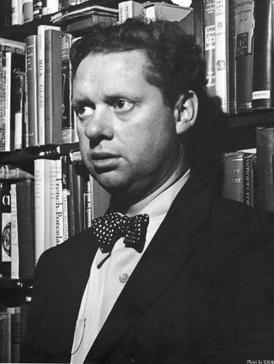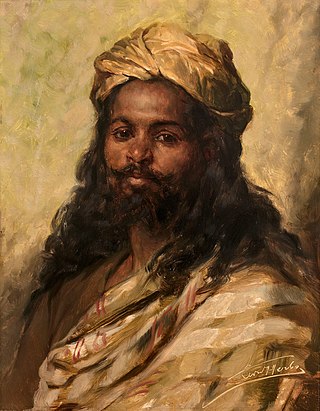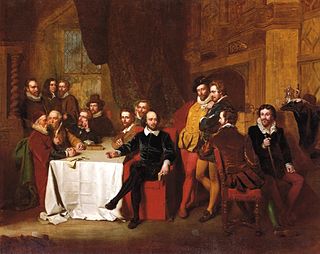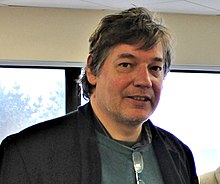
Dylan Marlais Thomas was a Welsh poet and writer whose works include the poems "Do not go gentle into that good night" and "And death shall have no dominion", as well as the "play for voices" Under Milk Wood. He also wrote stories and radio broadcasts such as A Child's Christmas in Wales and Portrait of the Artist as a Young Dog. He became widely popular in his lifetime; and remained so after his death at the age of 39 in New York City. By then, he had acquired a reputation, which he had encouraged, as a "roistering, drunken and doomed poet".

King Arthur is a legendary king of Britain, and a central figure in the medieval literary tradition known as the Matter of Britain.

Othello is a tragedy written by William Shakespeare, around 1603. The story revolves around two characters, Othello and Iago.

William Shakespeare was an English playwright, poet and actor. He is widely regarded as the greatest writer in the English language and the world's pre-eminent dramatist. He is often called England's national poet and the "Bard of Avon". His extant works, including collaborations, consist of some 39 plays, 154 sonnets, three long narrative poems, and a few other verses, some of uncertain authorship. His plays have been translated into every major living language and are performed more often than those of any other playwright. Shakespeare remains arguably the most influential writer in the English language, and his works continue to be studied and reinterpreted.

Geoffrey of Monmouth was a Catholic cleric from Monmouth, Wales, and one of the major figures in the development of British historiography and the popularity of tales of King Arthur. He is best known for his chronicle The History of the Kings of Britain which was widely popular in its day, being translated into other languages from its original Latin. It was given historical credence well into the 16th century, but is now considered historically unreliable.

Samuel Daniel (1562–1619) was an English poet, playwright and historian in the late-Elizabethan and early-Jacobean eras. He was an innovator in a wide range of literary genres. His best-known works are the sonnet cycle Delia, the epic poem The Civil Wars Between the Houses of Lancaster and York, the dialogue in verse Musophilus, and the essay on English poetry A Defense of Rhyme. He was considered one of the preeminent authors of his time and his works had a significant influence on contemporary writers, including William Shakespeare. Daniel's writings continued to influence authors for centuries after his death, especially the Romantic poets Samuel Taylor Coleridge and William Wordsworth. C. S. Lewis called Daniel "the most interesting man of letters" whom the sixteenth century produced in England.

A chapbook is a small publication of up to about 40 pages, sometimes bound with a saddle stitch.
The history of Swansea covers a period of continuous occupation stretching back a thousand years, while there is archaeological evidence of prehistoric human occupation of the surrounding area for thousands of years before that.

The Klingon Hamlet, or The Tragedy of Khamlet, Son of the Emperor of Qo'noS, is a translation of William Shakespeare's Hamlet into Klingon, a constructed language first appearing in the science fiction franchise Star Trek.

John Davies, FLSW was a Welsh historian, and a television and radio broadcaster. He attended university at Cardiff and Cambridge and taught Welsh at Aberystwyth. He wrote a number of books on Welsh history, including A History of Wales.

Nigel Jenkins was an Anglo-Welsh poet. He was an editor, journalist, psychogeographer, broadcaster and writer of creative non-fiction, as well as being a lecturer at Swansea University and director of the creative writing programme there.

William Shakespeare's style of writing was borrowed from the conventions of the day and adapted to his needs.
Mannikoth Ramunni Nair (1903–1943), better known by his pseudonym, Sanjayan, was a Malayalam writer, journalist and one of the pioneers of satirical writing in Malayalam literature. Along with E. V. Krishna Pillai, another of the notable Malayalam satirists, Sanjayan is known to have developed the genre of light essays in the language. Besides satires, he also wrote literary criticisms and translated Othello into Malayalam language.

Ernst Anselm Joachim Honigmann, FBA was a German-born British scholar of English Literature, Shakespeare scholar, and Fellow of the British Academy.

Mayadhar Mansingh was an Indian poet and writer who wrote in Odia. He received the Padma Shri, the fourth-highest civilian award in India, in 1967.

Scots-language literature is literature, including poetry, prose and drama, written in the Scots language in its many forms and derivatives. Middle Scots became the dominant language of Scotland in the late Middle Ages. The first surviving major text in Scots literature is John Barbour's Brus (1375). Some ballads may date back to the thirteenth century, but were not recorded until the eighteenth century. In the early fifteenth century Scots historical works included Andrew of Wyntoun's verse Orygynale Cronykil of Scotland and Blind Harry's The Wallace. Much Middle Scots literature was produced by makars, poets with links to the royal court, which included James I, who wrote the extended poem The Kingis Quair. Writers such as William Dunbar, Robert Henryson, Walter Kennedy and Gavin Douglas have been seen as creating a golden age in Scottish poetry. In the late fifteenth century, Scots prose also began to develop as a genre. The first complete surviving work is John Ireland's The Meroure of Wyssdome (1490). There were also prose translations of French books of chivalry that survive from the 1450s. The landmark work in the reign of James IV was Gavin Douglas's version of Virgil's Aeneid.

Rhys Trimble is a bilingual poet, teacher, visual poet, visual artist, musician and improvisational performance artist based in Wales. Trimble was born in Livingstone, Zambia in 1977, and was raised in Pontypool and latterly the head of the Neath Valley - Pontneddfechan. Trimble completed his first degree in biochemistry in the University of Sussex in 1999. Trimble is considered an important part of Welsh avant garde. He completed a BA in literature and creative writing from Bangor University in 2010, and published his first book of poetry, Keinc, the same year. |date= 14 July 2010 |quote=Rhys Trimble, 32, who lives in Bethesda, graduated with a BA in Literature and Creative Writing and has recently published his second novel Drone. Previous books include Keinc, Skine, The Red Book of Hergest Ward and kør (2023). He received a PhD from the University of Northumbria at Newcastle. His doctoral thesis was titled "Tywysogion". He has authored more than 15 books of poetry in Wales, England, India and the US since 2010, including Swansea Automatic, Anatomy Mnemonics for Caged Waves (US) and Hexerisk. He is the vocalist with the Punk/Improv/Noise group Lolfa Binc. Trimble has contributed works to public art in Denbigh, Conwy Valley and Blackpool, Trimble was Nominated for the TS Eliot prize 2016.
Illustrations of Northern Antiquities (1814), or to give its full title Illustrations of Northern Antiquities, from the Earlier Teutonic and Scandinavian Romances; Being an Abstract of the Book of Heroes, and Nibelungen Lay; with Translations of Metrical Tales, from the Old German, Danish, Swedish, and Icelandic Languages; with Notes and Dissertations, was a pioneering work of comparative literature which provided translations and abstracts of various works written in medieval Germany and Scandinavia. Its three authors were Henry Weber, who précised the Nibelungenlied and Heldenbuch; Robert Jamieson, who translated Danish and other ballads, stressing their close connection with Scottish ballads; and Walter Scott, who provided an abstract of Eyrbyggja saga. It significantly extended British readers' access to early Germanic literature.
Jörg Heinz Bernig is a German poet, novellist and essayist.















